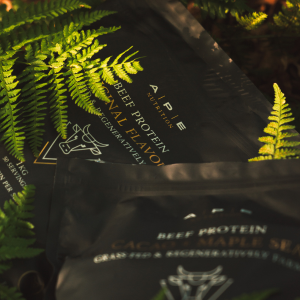From season-to-season, our nutritional needs change drastically. In Spring, the body requires foods and herbs that naturally support detoxification, whilst Summer requires us to choose nutrients that hydrate and cool us. When it comes to Autumn and Winter, this shifts again, with an increased demand for fatty foods and immune boosting compounds to bolster us against the colder months. Research shows that human gene expression alters throughout the year, and that seasons even regulate genetic expression and the composition of blood cells – simply put, this means that our DNA is literally changing in response to the seasons, as well as the foods we eat.
One of the most powerful ways to give the body what it truly needs throughout the year is to eat seasonally and alter the nutrients we consume as the weather changes. Nature is always giving us what we need, when we need it. In Summer for example, foods high in antioxidants help protect us from sun damage, whilst Winter foods such as elderberries and rosehips support the immune system. Animals foods are some of the most nutrient-dense foods on the planet and are a staple year round, providing us with the raw materials to support a healthy body all year long. However, the vitamins and minerals from animals become even more important in the Winter, when under natural conditions our other options reduce drastically. Just because we can override this in the modern world, importing fruits and vegetables from hotter climates during our Winter, this doesn't mean we should. Our bodies have been moulded over centuries of evolution to eat more carnivorously during the winter, so this is how they are designed to thrive.
Basically, we’ve eaten seasonally for thousands of years, so this is what the body truly needs.
To help support your health this Winter, we've made a list of the top 10 nutrients you need during the colder months and why. As well as listing out their best UK Winter available food sources:
1.) Vitamin D
Vitamin D is vital for the immune system and maintaining healthy bones. Whilst we can synthesise vitamin D from the sun in Summer and store it for a couple of months, the darker months require us to get vitamin D from foods.
Best sources: oily fish, liver, egg yolks.
2.) Vitamin C
Important for immune health, skin, and acting as an antioxidant, vitamin C is also needed for healthy adrenals and is depleted by stress. If it’s been a stressful year for you, it’s definitely worth increasing your vitamin C intake this Winter.*
Best sources: Rosehips, brussels sprouts, broccoli, celeriac, kidney, liver.
*In the UK, eating seasonally can sometimes mean vitamin C is hard to come-by, as citrus fruits don't grow naturally here. Luckily, our ancestors knew how to obtain vitamin C to keep themselves healthy, so we can benefit from their wisdom today. Rosehips grow amongst hedgerows in Autumn and Winter and are a potent source of vitamin C (you can find a recipe for an immune-supporting Rosehip tonic here).
3.) B12
Low vitamin B12 is linked to fatigue, mouth ulcers, muscle weakness, depression and anxiety. We need this nutrient all year round, but especially to support mood levels through the darker months.
Best sources: Red meat, organ meats, fish, eggs.
4.) B6
B6 is a super nutrient for the nervous system and mood. If you feel a little low in Winter, try increasing your intake of this vitamin through natural foods. Excess alcohol consumption can block the absorption of vitamin B6, so either try to reduce alcohol intake, or consume more B6-rich foods if you are drinking this Winter.
Best sources: Beef liver, pork, fish, potatoes.
5.) Iron
Many women experience low iron levels due to menstrual bleeding, pregnancy, as well as simply not getting enough of it through diet. Iron is vital for helping us feel alert and strong. It helps transport oxygen around the body and we also need it for hormone production. We need this mineral throughout Winter to help boost mood and energy levels, but it also supports the immune system. Getting iron naturally through foods is important, as some iron supplements can interact with zinc levels, and may cause gastrointestinal issues. Heme iron from animal foods is also much more easily absorbed by the body than non-heme iron from plants. Try pairing iron-rich foods with vitamin C to increase absorption.
Best sources: Red meat, organ meats, seafood.
6.) Zinc
We need zinc for immune health and metabolism, as well as our sense of smell. In Winter, zinc helps protect us from illness, as well as maintaining a healthy metabolism to transform our food into energy. If you do get ill this Winter, studies show that zinc can help reduce the amount of time you’re likely to be ill for, so stock up on this nutrient.
Best sources: Oysters, beef, dairy, chicken.
7.) Selenium
Selenium plays a crucial role in thyroid function, and research shows that thyroid health fluctuates seasonally, with poor thyroid function occurring mostly in Winter. When the thyroid is sluggish, we feel sluggish too, so increasing selenium intake from foods can help give it a boost in Winter.
Best sources: organ meats (especially kidney), seafood, red meat, chicken.
8.) Vitamin A
This nutrient supports the immune system by acting on immune cells and improving epithelial cell function. We also need vitamin A for eye health; specifically for improving our vision in dim light. Many people have issues converting beta-carotene into the active form of vitamin A, so including foods high in the active form (retinol) is the most powerful way to obtain it.
Best sources: liver, fish, eggs, dairy.
9.) Tryptophan
This amino acid plays an important role in our mood and sleep. Tryptophan is the precursor to serotonin – a hormone that helps us feel happy and relaxed, reducing anxiety and low mood levels often associated with Winter. It’s also an important precursor to melatonin – the ‘sleep hormone’. Ideally, we need to be getting more sleep in Winter to support restoration and rejuvenation of the body and mind, and consuming more foods with tryptophan can help with this.
Best sources: Salmon, chicken and turkey, eggs, dairy.
10.) Glycine
Promoting good quality sleep, improved gut health and stimulating the production of the feel-good hormone serotonin, glycine is a wonderfully nourishing Winter nutrient. Our ancestors would have had plenty of glycine in their diets from eating nose-to-tail meaty stews, soups and broths, which bolstered the immune system and supported them all season long.
Best sources: bone broth, grass-fed protein powder, red meat, collagen
Here are a few extra's we've added in this year
11.) Anti-Viral Herbs
Winter doesn’t have to be ‘cold and flu season’ if we know how to properly nourish ourselves. Humans have been turning to natural anti-viral herbs for immune support for thousands of years, and we can use them to both prevent and remedy seasonal illness. In the UK, herbs like rosemary, Sage and thyme grow naturally in Winter, which is a sign they can boost our health in this season.
Best sources: Rosemary, thyme, sage, Winter savory
12.) Copper
Copper works alongside iron to support immunity and energy, which is why our iron-rich Beef Spleen supplement also includes liver as a great source of copper. Just as copper wiring helps the energy and electricity in your home to work well, having good nutritional levels of copper within the body helps boost our own energy by optimising mitochondria, reducing inflammation and aiding that all important iron absorption.
Best sources: Beef liver, oysters, cacao.
13.) Beta-Glucans
Natural fibres that act as biological immune-activators, beta-glucans ‘train’ the immune system to respond effectively to pathogens by activating bacteria-fighting cells. They can help the body combat and overcome viruses earlier and faster, reduce inflammation and support gut barrier health.
Best sources: mushrooms like reishi, chaga, lion's mane and shiitake.
We help this guide help you and your family stay healthy and strong throughout the winter season!








